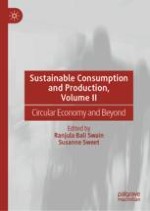2021 | OriginalPaper | Buchkapitel
4. Critical Approaches to Circular Economy Research: Time, Space and Evolution
verfasst von : Helen Holmes, Harald Wieser, Julia Kasmire
Erschienen in: Sustainable Consumption and Production, Volume II
Aktivieren Sie unsere intelligente Suche, um passende Fachinhalte oder Patente zu finden.
Wählen Sie Textabschnitte aus um mit Künstlicher Intelligenz passenden Patente zu finden. powered by
Markieren Sie Textabschnitte, um KI-gestützt weitere passende Inhalte zu finden. powered by
